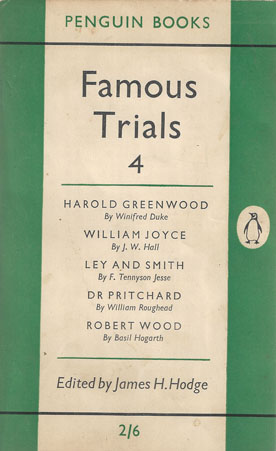
Out of Print
The Penguin Famous Trials series was started by Harry Hodge, who was Managing, Director of William Hodge & Co., Ltd, Publishers and Shorthand Writers. The son and grandson of a printer, he followed his father as one of the most expert of shorthand writers in Scotland, and for some fifty years was a well-known figure in the Scottish Courts both in that capacity and as a publisher of legal works.
In 1905 he founded The Notable British Trials Series which now extends to 70 volumes, commencing with that cause celebre, the Trial of Madeleine Smith. He was steeped in criminology all his life and held the view that a trial should be at least twenty years old before it can proveitself to have been notable, although this view had to be modified under modern conditions.
As general editor of that series he carefully selected his editors and insisted on the greatest possible accuracy in the presentation of each volume. Outside of his business life Mr Hodge's main interest was devoted to music, and he has a number of compositions to his name. He died in November 1947.
Since his death both The Notable Trial Series and the Penguin Famous Trials have been edited by his son, James Hozier Hodge. Moreover, in 1948, after long negotiations, James Hodge produced the first volumes in the War Crimes Trials Series, of which he is the assistant general editor to Sir David Maxwell Fyfe,P.C., Q.C., M.P
Volume 4Harold Greenwood's wife died showing some of the symptoms of poisoning, but his main crime seemed to be his remarriage within four months. Robert Wood, accused of the murder of a prostitute, was also defended by Marshall Hall, who used all his considerable skills in both cases.
There was no such ambiguity of evidence at the trial of Dr Pritchard, who was the last man to be publicly hanged in Glasgow. Of the two men accused in the bizarre `Chalk Pit Murder', one became Broadmoor's richest inmate. Finally, the treason trial of William Joyce wartime's Lord Haw-Haw — set a precedent in legal history.